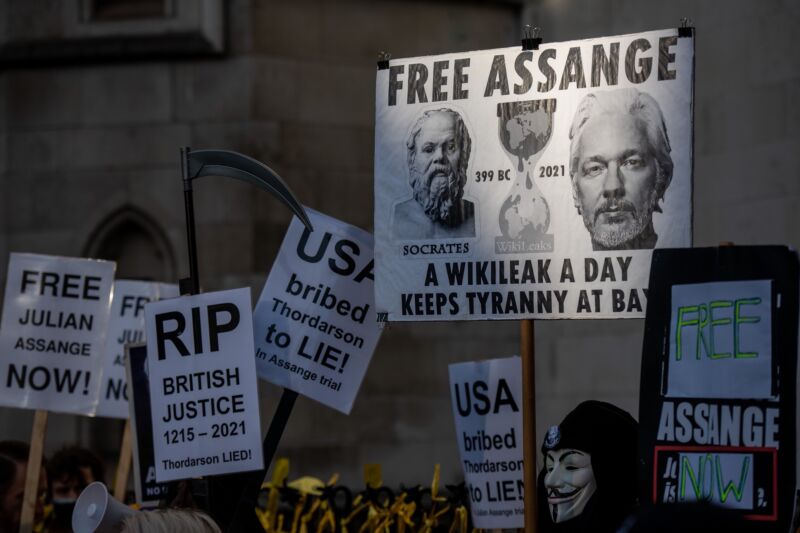
A UK court ruling today brought the US government one step closer to securing the extradition of Julian Assange, the WikiLeaks founder who faces criminal charges for his alleged role in helping Chelsea Manning steal classified information from the US Department of Defense. The ruling was issued today by the UK’s High Court of Justice in London.
Today’s decision came in response to the United States’ appeal of a January 2021 district judge’s ruling that rejected the extradition request on the grounds that Assange would be at greater risk of suicide in the American prison system. The district judge’s ruling criticized US prison conditions and noted that “Jeffrey Epstein committed suicide at the MCC jail in August 2019” and Chelsea Manning “was hospitalized after an attempt to commit suicide at the ADC jail [William G. Truesdale Adult Detention Center in Alexandria, Virginia] in 2020.”
In February, the US offered several assurances to the UK about how Assange will be treated after extradition. The High Court was satisfied that these assurances “[e]xclude the possibility of Mr. Assange being made subject to ‘special administrative measures’ or held at the ‘ADX’ facility (a maximum-security prison in Florence, Colorado, in the US), either pretrial or after any conviction, unless, after entry of the assurances, he commits any future act which renders him liable to such conditions of detention,” according to the court’s summary of today’s ruling.
The US also agreed to let Assange serve any prison sentence in Australia if he is convicted and to give Assange appropriate clinical and psychological treatment while he is held in the US prison system. The High Court was “satisfied that the assurances were sufficient to meet the concerns” that led to the district judge’s decision to block the extradition.
Extradition not imminent
Today’s ruling does not guarantee the extradition of Assange. The High Court “ordered that the case must be remitted to Westminster Magistrates’ Court with a direction that a DJ [district judge] send the case to the Secretary of State, who will decide whether Mr. Assange should be extradited to the USA,” the summary of the ruling said.
Assange can also appeal today’s ruling. “Mr. Assange’s fiancée, Stella Moris, said in a statement following the verdict that Mr. Assange and his team ‘will appeal this decision at the earliest possible moment,’ setting the stage for weeks or even months of further legal wrangling, lawyers say,” according to The Wall Street Journal.
Espionage Act charges raised press-freedom concerns
Assange was arrested by British police in April 2019 after spending nearly seven years in the Ecuadorean embassy in London. The US charged Assange with conspiracy to obtain and disclose national defense information, conspiracy to commit computer intrusions, six counts of obtaining national defense information, and nine counts of disclosure of national defense information, according to a superseding indictment entered in June 2020 in US District Court for the Eastern District of Virginia.
The US’s decision to charge Assange under the Espionage Act was criticized by the top editors of The New York Times, Washington Post, Wall Street Journal, and USA Today as an attack on freedom of the press. “Dating as far back as the Pentagon Papers case and beyond, journalists have been receiving and reporting on information that the government deemed classified,” Washington Post then-Executive Editor Marty Baron told the Daily Beast after the initial indictment was unsealed in 2019. “Wrongdoing and abuse of power were exposed. With the new indictment of Julian Assange, the government is advancing a legal argument that places such important work in jeopardy and undermines the very purpose of the First Amendment.”
“A fundamental principle of the First Amendment is that journalists have the right to publish truthful information, even when a source may have broken the law to provide that information,” New York Times Executive Editor Dean Baquet said at the time. “In charging Julian Assange for receiving and disclosing classified information in violation of the Espionage Act, the government threatens to undermine that basic tenet of press freedom. Obtaining and publishing information that the government would prefer to keep secret is vital to journalism and democracy.”
While Assange was indicted during Trump’s presidency, the Biden administration has continued to seek Assange’s extradition.
https://arstechnica.com/?p=1819586

